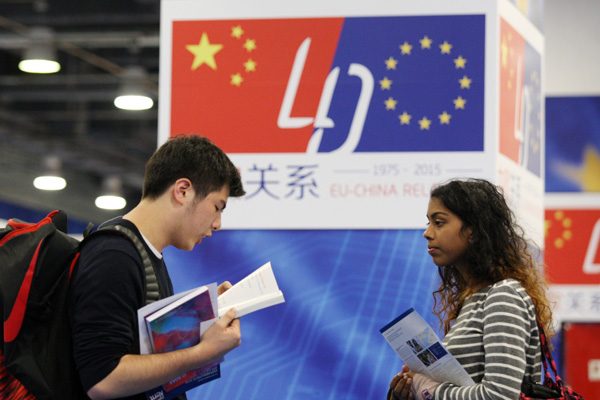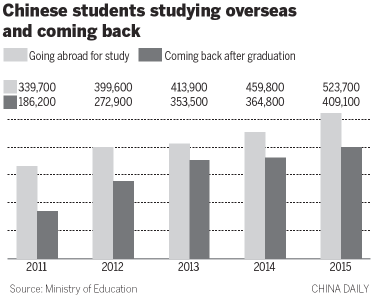What brain drain are you talking about These days more and more decide to return because glass ceiling,slow economic growth,discrimination and more opportunity at home
According to statistics released on the ministry's website, a total of 523,700 Chinese students went overseas to study in 2015, marking a 14 percent year-on-year rise. Meanwhile, 409,100 students returned from overseas study last year, up 12 percent on 2014.
Another notable trend, the ministry said, is that the ratio of those going abroad and those coming back has narrowed from 3.15 students going overseas in 2006 for every one that returned, to 1.28 for each returnee in 2015.
Booming economy, improved job prospects mean growing number envision better future
A student attends the 2015 China Education Expo in Beijing, Oct 25, 2015. [Photo by Wang Zhuangfei/China Daily]
Both the number of Chinese students heading overseas to study and the number of those returning to China after finishing their studies abroad have increased in comparison with the year before, the Ministry of Education said on Tuesday.
According to statistics released on the ministry's website, a total of 523,700 Chinese students went overseas to study in 2015, marking a 14 percent year-on-year rise. Meanwhile, 409,100 students returned from overseas study last year, up 12 percent on 2014.
Another notable trend, the ministry said, is that the ratio of those going abroad and those coming back has narrowed from 3.15 students going overseas in 2006 for every one that returned, to 1.28 for each returnee in 2015.
Chen Zhiwen, editor-in-chief of EOL, China's largest online education portal, said the trend started to become obvious a few years ago, when the Chinese economy took off and the economic gap between China and other developed countries began to shrink.
Decades ago, very few Chinese people came back after finishing their studies overseas because they saw developed countries as "heaven", he said.
"But with the booming Chinese economy, domestic conditions have improved and there is a stronger need for talent. Not to mention the Chinese government has brought in a series of preferential policies to attract people back," Chen said. "In addition, a rapidly developing economy and a lot of emerging industries usually create more jobs and other opportunities and this is also a factor that adds to students' willingness to come back."
Zheng Tianying, CEO of the University and College Admissions System, a company that provides services to overseas students hoping to attend a Chinese college or university, said Chinese students' perspective about overseas study has also been changing.
"Studying abroad, which used to be a rare, life-changing opportunity for very few Chinese students and their families, has become a common practice that is enjoyed by many students from China in recent years," Zheng said. "More students are just heading overseas for a while to experience it or to broaden their vision and then they are coming back."
Between 1978 and 2015, more than 4 million Chinese people went overseas to study. Of those, 2.22 million have returned, the ministry said.



